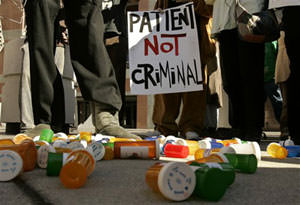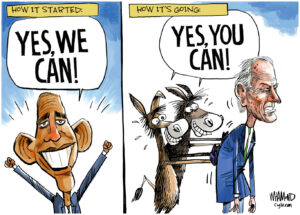Obama Administration’s War on Pot in California
The U.S. attorneys who have declared war on California's medical marijuana industry remind me of the prohibition agents in the HBO show "Boardwalk Empire."
One of the most striking inconsistencies of President Obama’s administration is its odd stand on the use of marijuana to relieve the suffering of those stricken with cancer, HIV/AIDS, glaucoma, migraines and many other debilitating and painful ailments.
In 1996 California voters approved a law permitting the growth, sale and possession of marijuana for such conditions on the recommendation of a physician. Oregon and Washington state, also by popular vote, legalized medical marijuana. In the past 15 years, a total of 16 states and the District of Columbia have adopted such laws. Ten of them were by popular vote.
But in October, four federal prosecutors in California announced a crackdown on the growers and dispensaries that distribute marijuana in the state. Laura Duffy, the U.S. attorney in San Diego, said she and her colleagues acted because the medical marijuana business was “turning more and more into a retail for-profit industry.” Andre Birotte Jr., the U.S. attorney in Los Angeles, said, “Marijuana sales — most often to individuals who have obtained sham doctors’ recommendations for no purpose other than to engage in recreational marijuana use — are the basis of a massive commercial industry.”
The U.S. attorneys, the legal arms of Obama’s Justice Department, have gone far beyond that. Despite state and local laws authorizing growers and distributors, they have sent letters to local officials and to owners of properties which house the marijuana distributors, warning they are violating federal law. Letters have been sent to more than a dozen dispensaries and their landlords, as well as to city officials approving or contemplating approval of such operations.
No matter what Duffy, Birotte and the other U.S. attorneys said at their news conference, their letters do not acknowledge the state’s stand for medical marijuana. To them, it seems that marijuana is marijuana — all bad.
This is quite a change from what Obama said while running for president in 2008.
“When it comes to medical marijuana, I have more of a practical view than anything else,” candidate Obama said. “My attitude is if it’s an issue of doctors prescribing medical marijuana as a treatment for glaucoma or as a cancer treatment, I think that should be appropriate because there really is no difference between that and a doctor prescribing morphine or anything else. I think there are legitimate concerns in not wanting to allow people to roll their own or start setting up mom-and-pop shops because at that point it becomes fairly difficult to regulate.”
The Drug Enforcement Administration and Department of Health and Human Services weren’t listening. Despite Obama’s words, his administration’s real policy is spelled out in a ruling by the Justice Department’s DEA recorded in the Federal Register, Vol. 76, No. 131, July 8, 2011. It was a decision made deep in the bureaucracy, revealed in a publication unknown to most people.
Marijuana is regulated by the DEA as a Schedule 1 drug, along with codeine, heroin, LSD and several others. Some medical marijuana advocates asked that it be made a Schedule 2 drug. These are drugs that, while they may cause dependency, are accepted for medical use. Methadone is such a drug.
The medical literature is full of research by physicians from prominent medical schools showing its value for certain conditions. But basing its decision on a report by the Department of Health and Human Services, the DEA said there was not enough evidence that marijuana had a medical use.
I am only a layman, but I didn’t find that argument convincing. The two government agencies provided no evidence that marijuana was any more harmful than gin. The Health and Human Services report agreed with other research that marijuana use didn’t lead to ingestion of heroin or other drugs, and was no more addictive than cigarettes. But the HHS report rejected the published studies of physicians and other researchers who found benefits in marijuana. The report was full of bureaucratic gobbledygook, designed to make it unreadable, hidden away in the Federal Register, not a well-read publication.
It’s a complicated matter. Some medical marijuana advocates say that big-time growers want to use medical marijuana as a foot in the door for complete legalization. Professor Gerald Uelmen of the Santa Clara University Law School, who has defended medical marijuana distributors, told me, “I felt it was a legitimate medicine, miraculous in the relief it gives to people who are suffering peripheral pain, and undergoing chemo. …” But he feels many advocates regard medical marijuana as “a camel’s nose in the tent, a way to soften up the opposition and achieve total legalization.” This, he said, jeopardizes the medical marijuana movement.
Money is an important factor in the debate. There is plenty of it in the business. On a recent Sunday, I saw several dispensaries side by side on Venice Beach in Los Angeles, charging $100 for a doctor’s consultation for a laundry list of conditions listed outside the “offices,” plus an introduction to a nearby dispensary.
Any ailment, actual or fictitious, was good enough for a doctor’s prescription. The sleazy beachside booths, manned by fringe characters, were probably not what leaders of the medical marijuana movement had in mind when they wrote the ballot measure that changed the law.
“We have strayed away from what is allowed by state law,” said Jane Usher of the Los Angeles city attorney’s office, which is trying to close down such operations.But there’s money in the marijuana business and it is drawing entrepreneurs and investors. Recently, I saw evidence of that when I attended the International Drug Policy Reform Conference in Los Angeles.
I went to a panel discussion there on how to become a marijuana entrepreneur. The panelists talked of the business opportunities in “a new and emerging industry”; cultivating marijuana and selling it in dispensaries; “ancillary businesses”; market research; hard-to-find investors, including hedge funds; packaging; and the difficulty of raising money for political action committees.
It was as boring as an investment seminar. But as I listened, I could see this was the way the business could eventually go, despite the efforts of federal prosecutors. The marijuana entrepreneurs will throw their money around, the public will demand a change and the politicians will fold. The U.S. attorneys remind me of the prohibition agents in the HBO show “Boardwalk Empire,” swamped by the tide of booze flowing through Atlantic City and the rest of the United States.
This isn’t an easy issue for me as a parent and grandparent. I don’t want to encourage marijuana use. I don’t want to see giant conglomerates go into the pot business with the same kind ads used to sell alcohol and cigarettes. Imagine the commercials on television with the so-called guys’ guys pitching for pot “Lite.”
But while booze and cigarettes are harmful, they are legal. Why should marijuana be different? Or, as professor Uelmen said, “Ultimately we should change the law and make it legal. On a cost-benefit balance, the prohibition is costing us more than we are gaining.”
That is not the immediate question, however. What’s important now is that presidential candidate Barack Obama in 2008 endorsed the idea of physicians prescribing medical marijuana.
After Obama’s election, the bureaucrats reversed him. Now he should reverse them. Nine members of Congress, including conservative Republican Dana Rohrabacher, put it this way in a letter to the president: “By pursuing the same harsh policies that have been in place for years, we fear that the federal government will push legitimate patients back into the uncertainty and danger of the illicit market.”
Obama should immediately order the DEA to make marijuana a Schedule 2 drug, available at a pharmacy or a retail store with prescribing doctors regulated and marijuana quality assured. There are a lot of sick people needing help.
Your support matters…Independent journalism is under threat and overshadowed by heavily funded mainstream media.
You can help level the playing field. Become a member.
Your tax-deductible contribution keeps us digging beneath the headlines to give you thought-provoking, investigative reporting and analysis that unearths what's really happening- without compromise.
Give today to support our courageous, independent journalists.








You need to be a supporter to comment.
There are currently no responses to this article.
Be the first to respond.